Viet Nam communes trial community-based drug dependence treatment
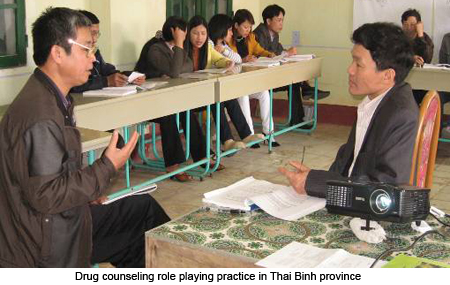
Hanoi (Viet Nam), 27 March 2012 - As part of its goal to reduce illicit drug relapse rates, Viet Nam has just begun to pilot a community-based drug dependence treatment programme in three northern provinces. Developed by Vietnamese authorities with the support of UNODC's Treatnet II project, the pilot projects - located in the provinces of Hoa Binh, Thai Binh, and Thanh Hoa - are part of a model that, it is hoped, will become a blueprint for a national community-based drug treatment service.
Coordinated by the Ministry of Labour, Invalids and Social Affairs (MOLISA), the new Community-Based Drug Dependence Treatment model has as a key programme objective to support the recovery of people dependent on drugs and to keep them living in their communities.
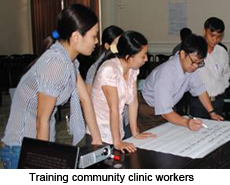 UNODC's strategy for drug dependence treatment promotes evidence-based and ethical treatment policies worldwide. Under its
"Treatnet II" programme, the new Viet Nam initiative offers services as part of a 'continuum of care' provided by health care staff, social workers and community outreach workers. Tailored to drug users' needs, the services include consultation with and support to drug users and their families - a significantly different approach from before.
UNODC's strategy for drug dependence treatment promotes evidence-based and ethical treatment policies worldwide. Under its
"Treatnet II" programme, the new Viet Nam initiative offers services as part of a 'continuum of care' provided by health care staff, social workers and community outreach workers. Tailored to drug users' needs, the services include consultation with and support to drug users and their families - a significantly different approach from before.
"In the pilot communes we are responding to community needs and to the Government's mandate to provide community-based treatment," said Mr. Trieu Huy Tao, director of the Department of Social Evils Prevention (DSEP) in Thanh Hoa City, one of the trial locations. "In the past we considered drug users illegal persons. Now, through the pilot community-based treatment programme, we communicate with drug users. They have a voice and can participate in community life."
Programme services include community awareness, outreach, prevention of HIV transmission, medical care and treatment (including referral to methadone maintenance where available), counselling, case management, vocational training, relapse prevention, community re-integration, micro-credit facilities and income-generating activities.
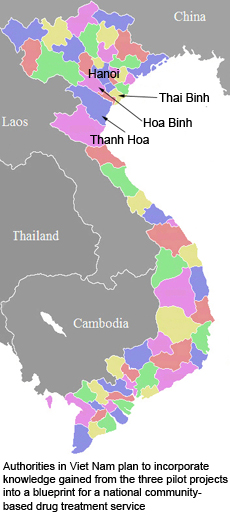 There are more than 143,000 registered drug users in Viet Nam, although the number of actual users is thought to be considerably higher. Heroin has long been the primary illicit drug of use in Viet Nam. In 2010, amphetamine-type stimulants (ATS) overtook opium as the second most common drug of use, say government experts. According to the Standing Office on Drug and Crime (SODC), 68 per cent of all drug users are under 30 years of age. SODC estimates that as many as half of all persons living with HIV in Viet Nam were infected through injecting drug use.
There are more than 143,000 registered drug users in Viet Nam, although the number of actual users is thought to be considerably higher. Heroin has long been the primary illicit drug of use in Viet Nam. In 2010, amphetamine-type stimulants (ATS) overtook opium as the second most common drug of use, say government experts. According to the Standing Office on Drug and Crime (SODC), 68 per cent of all drug users are under 30 years of age. SODC estimates that as many as half of all persons living with HIV in Viet Nam were infected through injecting drug use.
The pilot services supported by Treatnet II are an evidence-based alternative to the compulsory centres currently in use throughout Viet Nam. Viet Nam has 123 so-called 06 centres (compulsory drug rehabilitation centres) managed by MOLISA. Clinical care and effective evidence-based drug treatment in the majority of these centres remain rudimentary, according to
UNODC's Patterns and Trends of Amphetamine-type Stimulants (ATS) and other Drugs - Asia and the Pacific (2011).
Aside from the pilot community-based services, Treatnet II in Viet Nam has worked with national authorities to develop national standards of care and draft community-level policies, protocols and practice, and train nine trainers and 162 staff in drug dependence treatment and care services.
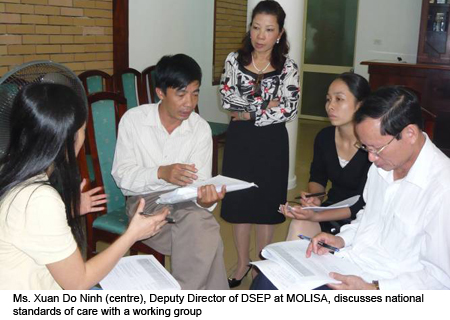
At a recent workshop to develop national standards of care organized as part of Treatnet II activities, Ms. Xuan Do Ninh, Deputy Director of DSEP, commented: "This treatment model provides integrated health and social services to drug users. Service providers now have guidance tools that build on the Treatnet training materials: the service delivery model, care and treatment standards, and standard operating procedures . We believe this new model will help provinces better implement their community-based approach to drug addiction treatment."
BACKGROUND
Implemented in 20 countries in four regions around the globe, Treatnet II works to promote a sound understanding of evidence-based drug dependence treatment and care (including HIV/AIDS prevention) and the recognition of drug dependence as a health disorder that requires a multidisciplinary and comprehensive approach. Treatnet II funding worldwide is provided by Canada, Germany, Japan, OPEC Fund for International Development, Spain, Sweden and the USA.
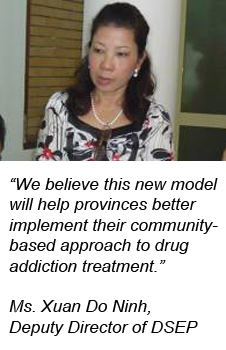

 UNODC's strategy for drug dependence treatment promotes evidence-based and ethical treatment policies worldwide. Under its
"Treatnet II" programme, the new Viet Nam initiative offers services as part of a 'continuum of care' provided by health care staff, social workers and community outreach workers. Tailored to drug users' needs, the services include consultation with and support to drug users and their families - a significantly different approach from before.
UNODC's strategy for drug dependence treatment promotes evidence-based and ethical treatment policies worldwide. Under its
"Treatnet II" programme, the new Viet Nam initiative offers services as part of a 'continuum of care' provided by health care staff, social workers and community outreach workers. Tailored to drug users' needs, the services include consultation with and support to drug users and their families - a significantly different approach from before.
 There are more than 143,000 registered drug users in Viet Nam, although the number of actual users is thought to be considerably higher. Heroin has long been the primary illicit drug of use in Viet Nam. In 2010, amphetamine-type stimulants (ATS) overtook opium as the second most common drug of use, say government experts. According to the Standing Office on Drug and Crime (SODC), 68 per cent of all drug users are under 30 years of age. SODC estimates that as many as half of all persons living with HIV in Viet Nam were infected through injecting drug use.
There are more than 143,000 registered drug users in Viet Nam, although the number of actual users is thought to be considerably higher. Heroin has long been the primary illicit drug of use in Viet Nam. In 2010, amphetamine-type stimulants (ATS) overtook opium as the second most common drug of use, say government experts. According to the Standing Office on Drug and Crime (SODC), 68 per cent of all drug users are under 30 years of age. SODC estimates that as many as half of all persons living with HIV in Viet Nam were infected through injecting drug use.
